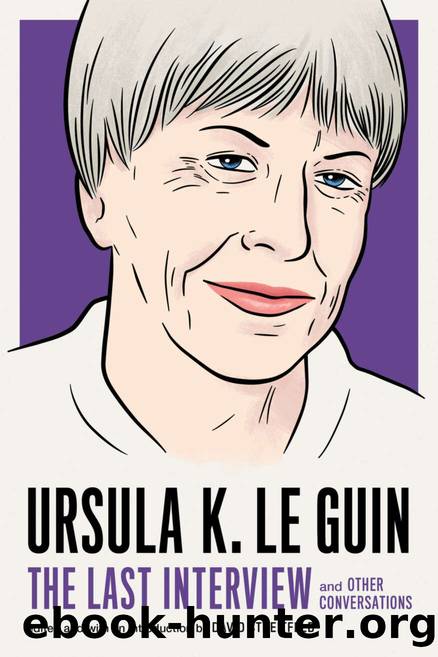Ursula K. Le Guin: and Other Conversations by Ursula K. Le Guin

Author:Ursula K. Le Guin [Le Guin, Ursula K.]
Language: eng
Format: epub
Publisher: Melville House
Published: 2019-02-05T00:00:00+00:00
* * *
â
We ate a dinner of cold salmon from the Columbia Gorge, sitting at a picnic table on the broad porch that encircles the rear of the house, âleftoversâ from a farewell dinner Le Guin had made for her daughter Caroline the night before. (Caroline was returning to Indiana, where she is starting her doctorate in Irish literature.) On the table was a small cup holding little silver spoons, very soft, very high-quality silver, commemorative pieces minted in different towns in Colorado during the great silver mining days. They were collected by Le Guinâs mother, Theodora; one was from Telluride, where she grew up.
Theodora met and married Alfred Kroeber in Berkeley, where he was a professor of anthropology at the university and she was his student (he remembered her bracelets clinking together when she spoke in class). Alfred is perhaps most well-known for his work and friendship with Ishi, a Stone Age man, the last of his tribe, who stumbled into the twentieth century in 1911. (Ishi died of tuberculosis in 1916, when he was probably fifty-six.) But it was Theodora Kroeber who, in her sixties, wrote the book Ishi In Two Worlds, which became nearly as popular as Coming of Age in Samoa and is considered a standard text in anthropology.
Much of Le Guinâs feeling for the Other, the anthropological details in her books and her fierce devotion to a balanced way of living on the earth, can be traced to her early upbringing. Although the name Ishi was never mentioned in the house (the subject seemed to cause Alfred Kroeber pain), Ursula heard Native American stories and myths from her father. And she remembers him sitting and talking to two of his closest friends, one a Papago and the other a Yurok, men who, unbeknownst to her then, were also her fatherâs anthropological informants, and who stayed with the family in the Napa Valley each summer and played croquet with Ursula and her three older brothers.
There were other guests: refugees with funny accents, other Native Americans, and a man with large ears who would âreappearâ in her novel The Dispossessed: J. Robert Oppenheimer.*1
Ishi was published in 1961, a year after Alfred Kroeberâs death. The book is so well written that Ursula, stricken with guilt, asked her mother if she had been unable to write earlier because of having to raise children. Her mother replied, âI did what I wanted when I wanted to. I have long thought Iâd write when I wanted to.â She was, said Le Guin, âa very unusual person.â
Le Guin went to Berkeley High School, which she hated. âI wasnâtâyou know, I neverâmy sweaters were never quite the right length or color. I never could do it right.â She then went to Radcliffe, and later Columbia, where she earned an M.A. in French, figuring she would need a skill to support herself while writing. She had already submitted poems and short stories by the time she went off to collegeâher father volunteered to be her agent.
Download
This site does not store any files on its server. We only index and link to content provided by other sites. Please contact the content providers to delete copyright contents if any and email us, we'll remove relevant links or contents immediately.
Autoboyography by Christina Lauren(4701)
Asking the Right Questions: A Guide to Critical Thinking by M. Neil Browne & Stuart M. Keeley(4639)
Dialogue by Robert McKee(3631)
Eat That Frog! by Brian Tracy(3562)
Sticky Fingers by Joe Hagan(3474)
Journeys Out of the Body by Robert Monroe(3028)
Elements of Style 2017 by Richard De A'Morelli(2961)
Annapurna by Maurice Herzog(2874)
Schaum's Quick Guide to Writing Great Short Stories by Margaret Lucke(2828)
Full Circle by Michael Palin(2803)
The Diviners by Libba Bray(2467)
The Art of Dramatic Writing: Its Basis in the Creative Interpretation of Human Motives by Egri Lajos(2438)
The Mental Game of Writing: How to Overcome Obstacles, Stay Creative and Productive, and Free Your Mind for Success by James Scott Bell(2412)
Why I Write by George Orwell(2387)
Atlas Obscura by Joshua Foer(2369)
In Patagonia by Bruce Chatwin(2297)
The Fight by Norman Mailer(2178)
The Elements of Style by William Strunk and E. B. White(2089)
Venice by Jan Morris(2071)
